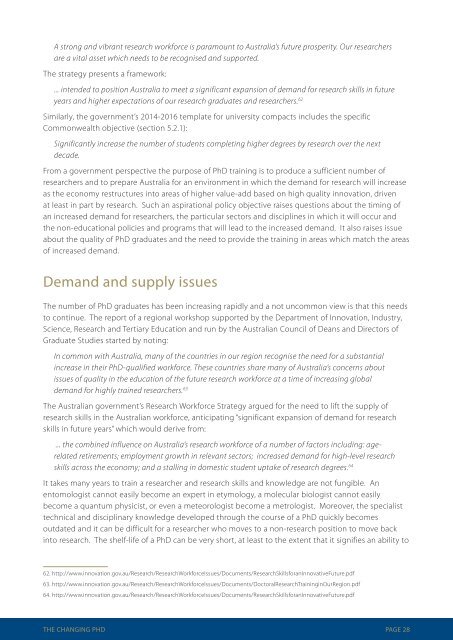the-changing-phd_final
the-changing-phd_final
the-changing-phd_final
Create successful ePaper yourself
Turn your PDF publications into a flip-book with our unique Google optimized e-Paper software.
A strong and vibrant research workforce is paramount to Australia’s future prosperity. Our researchers<br />
are a vital asset which needs to be recognised and supported.<br />
The strategy presents a framework:<br />
... intended to position Australia to meet a significant expansion of demand for research skills in future<br />
years and higher expectations of our research graduates and researchers. 62<br />
Similarly, <strong>the</strong> government’s 2014-2016 template for university compacts includes <strong>the</strong> specific<br />
Commonwealth objective (section 5.2.1):<br />
Significantly increase <strong>the</strong> number of students completing higher degrees by research over <strong>the</strong> next<br />
decade.<br />
From a government perspective <strong>the</strong> purpose of PhD training is to produce a sufficient number of<br />
researchers and to prepare Australia for an environment in which <strong>the</strong> demand for research will increase<br />
as <strong>the</strong> economy restructures into areas of higher value-add based on high quality innovation, driven<br />
at least in part by research. Such an aspirational policy objective raises questions about <strong>the</strong> timing of<br />
an increased demand for researchers, <strong>the</strong> particular sectors and disciplines in which it will occur and<br />
<strong>the</strong> non-educational policies and programs that will lead to <strong>the</strong> increased demand. It also raises issue<br />
about <strong>the</strong> quality of PhD graduates and <strong>the</strong> need to provide <strong>the</strong> training in areas which match <strong>the</strong> areas<br />
of increased demand.<br />
Demand and supply issues<br />
The number of PhD graduates has been increasing rapidly and a not uncommon view is that this needs<br />
to continue. The report of a regional workshop supported by <strong>the</strong> Department of Innovation, Industry,<br />
Science, Research and Tertiary Education and run by <strong>the</strong> Australian Council of Deans and Directors of<br />
Graduate Studies started by noting:<br />
In common with Australia, many of <strong>the</strong> countries in our region recognise <strong>the</strong> need for a substantial<br />
increase in <strong>the</strong>ir PhD-qualified workforce. These countries share many of Australia’s concerns about<br />
issues of quality in <strong>the</strong> education of <strong>the</strong> future research workforce at a time of increasing global<br />
demand for highly trained researchers. 63<br />
The Australian government’s Research Workforce Strategy argued for <strong>the</strong> need to lift <strong>the</strong> supply of<br />
research skills in <strong>the</strong> Australian workforce, anticipating “significant expansion of demand for research<br />
skills in future years” which would derive from:<br />
... <strong>the</strong> combined influence on Australia’s research workforce of a number of factors including: agerelated<br />
retirements; employment growth in relevant sectors; increased demand for high-level research<br />
skills across <strong>the</strong> economy; and a stalling in domestic student uptake of research degrees. 64<br />
It takes many years to train a researcher and research skills and knowledge are not fungible. An<br />
entomologist cannot easily become an expert in etymology, a molecular biologist cannot easily<br />
become a quantum physicist, or even a meteorologist become a metrologist. Moreover, <strong>the</strong> specialist<br />
technical and disciplinary knowledge developed through <strong>the</strong> course of a PhD quickly becomes<br />
outdated and it can be difficult for a researcher who moves to a non-research position to move back<br />
into research. The shelf-life of a PhD can be very short, at least to <strong>the</strong> extent that it signifies an ability to<br />
62. http://www.innovation.gov.au/Research/ResearchWorkforceIssues/Documents/ResearchSkillsforanInnovativeFuture.pdf<br />
63. http://www.innovation.gov.au/Research/ResearchWorkforceIssues/Documents/DoctoralResearchTraininginOurRegion.pdf<br />
64. http://www.innovation.gov.au/Research/ResearchWorkforceIssues/Documents/ResearchSkillsforanInnovativeFuture.pdf<br />
THE CHANGING PHD PAGE 28


